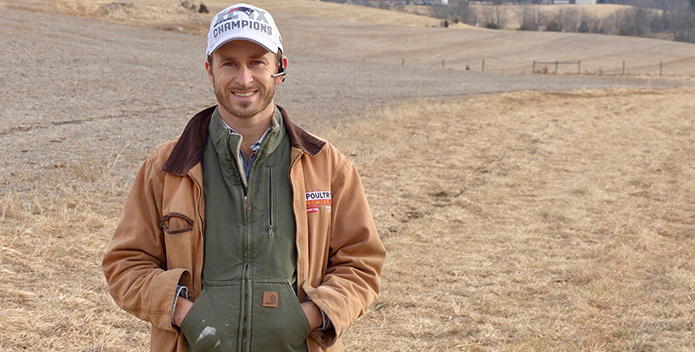(Staunton, VA)—Jimmy Crosby doesn't take a lot of ”bull” when it comes to his soil health. The former professional bull rider left home 16 years ago to join the rodeo but has now returned to his family's Virginia farm with a passion for making it more productive and profitable.
Though he's a fifth-generation farmer, Jimmy only recently took over management of the cash grain operations at Cros-B-Crest Farm in America's legendary Shenandoah Valley. Cash grains on this family farm are mainly corn, wheat, and soybeans.
”When I came home to farm, we needed to diversify our operation to create additional, steady income, corn after corn just wasn't working,” Crosby said. ”Healthy soil is the key to making money in the cash crop business.”
Now operating tractors and combines, he took a fresh look at the land and became concerned about soil erosion and excessive nutrients in the farm's streams and wetlands. Jimmy reached out to USDA's Natural Resources Conservation Service (NRCS) to get help designing a cropping system to improve soil health and water quality for increased profits.
With funding through the Environmental Quality Incentives Program (EQIP), he has implemented crop rotation, residue and tillage management, cover crops, and nutrient management practices on the land. His ”Beginning Farmer” status qualified him to receive incentive payments of up to 90 percent of installation costs for recommended conservation practices.
”Organic matter is the most important soil ingredient,” explained Crosby. ”To build healthy soil, my goal is to reach five percent organic matter. Our highest yielding field has 4.9 percent organic matter, producing the most with the least amount of inputs and rainfall.”
Crosby has now gone well beyond bull riding's acclaimed ”eight-second” mark to score high as a true Virginia soil health champion. In just a few short years, he has transitioned from beginning farmer to president of the Virginia No-Till Alliance (VANTAGE).
”Leaving crop residue on the land and planting cover crops are the easiest ways to increase organic matter in the soil,” Crosby added. ”It has laid the foundation for a successful, sustainable row-crop operation.”



